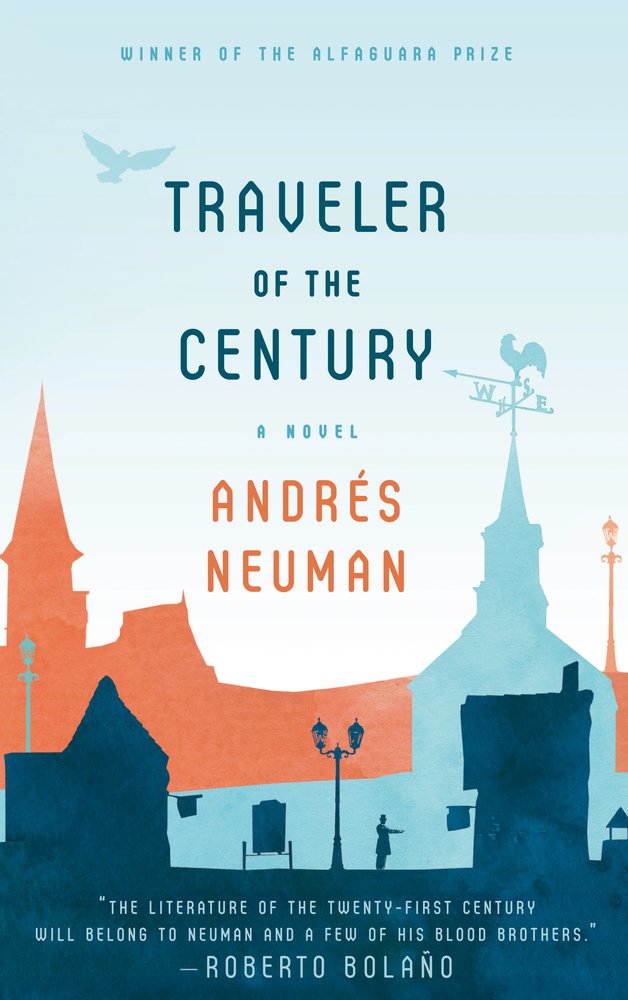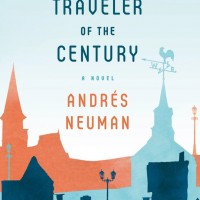
Traveller of the Century
by Andrés Neuman; translated by Nick Caistor and Lorenza Garcia
Farrar, Straus and Giroux; 576 p.
Being in the right place at the right time is an achievement. But ‘place’ or ‘time’ pale in comparison to the company. As hollow as San Francisco’s Haight- Ashbury or Paris’s St. Germain feel today, they remain sanctified because they will always be tethered to their respective generations. We go there in search of serendipity, desperate to preserve a moment.
For Hans, the itinerant translator and protagonist of Andrés Neuman’s Traveler of the Century, happenstance is a trap. With his heavy suitcase, he tries to pass through Wandernburg, a 19th-century German village of mystical design. I say ‘tries’ because Hans is soon seduced by the charm of the town and its inhabitants. His reasons for leaving are, and always have been, an illusion.
Hans falls in with two groups from the edges of local society. He first meets the sagely, nameless organ grinder, who from his remote cave offers wisdom and bonhomie. The men, including three of the town’s most cryptic bachelors, gather around a fire for cheap wine and twilight discussions about identity and politics and past lives, freed from Wandernburg’s segregations. Melancholy emanates.
Elsewhere, Hans finds love. The daughter of a stately widower, Sophie is much sharper than any of the drab intellectuals hosted at her weekly salons. But with Hans, she is more cunning. Luring him into one of his many impassioned monologues and then ignoring him, Sophie sates her own desire to confirm their mutual attraction, and stokes Hans with the right amount of sexual tension to burst into flames. Their letters are innocuous enough to mean little to a stranger. And yet:
If Sophie had not finished her letter with the usual polite phrase yours affectionately, perhaps her coy omission of that possessive revealed a sensual fear that could not be entirely ingenuous. Could it? Or couldn’t it? Was he imagining things? Was he making a fool of himself by being overly susceptible? Was he reading too much into it? Was he being too clever by half? Was he once more inadvertently confusing intelligence with conceit?
After nearly three hundred pages of tantric denial, they descend on each other carnivorously. Besides sex, which is miraculously well-written, they discover that a shared devotion for translating poetry is inseparable from their desire to understand each other. In abstraction, they repair humanity. Sophie menstruates, thinks of Kant. Hans encourages her to be unfaithful, so that he might learn something. Instead of pillow talk, they recite Wordsworth, whose poetry wasn’t about florid nostalgia, but revival.
A book this thick and thickheaded needs to air out. The curriculum is demanding enough though that it inspires you to meet all the requirements. But if you also find that it proves short, go back a step. The roving dialectics of Hans’s mazy Wandernburg nod at Thomas Mann’s Hans Castorp, who en route to The Magic Mountain finds that “two days of travel separate [him] from his everyday world,” as “space brings about changes very like those time produces, yet surpassing them in certain ways, removing an individual from all relationships and placing him in a free and pristine state.”
But our Hans doesn’t have to pick: his relationship is freedom. It’s what makes Traveler of the Century a recursive, not terribly sentimental book about love and its trappings.
Reeling, Sophie finds that time has stopped, “aware of how fast it is going,” though left wondering – “Is that what being in love is?”
“Sometimes it feels strange not to think about the future,” she said, “as though it were never going to happen.”
“Don’t worry,” said Hans. “The future doesn’t think about us much either.”
They aren’t alone in their sense of aloneness, a spool unwound in the coexisting perspectives and sexual frissons of servants, bored housewives, a censorious padre, and a chilling rapist.
These synchronous points exalt Neuman’s own. Startlingly prolific, the 35-year-old Argentine-Spaniard has plumbed those depths before. His accomplishments include books, short story collections, poems, translations, and gushing praise from Roberto Bolaño, who was “hypnotized” by Neuman’s ability to concoct “great literature,” the sort where “everything is real, everything is an illusion.”
The legacy has friction. Bolaño was, like Neuman, under a great radiance cast by Latin America and Europe. America was slow. In his essay for the Los Angeles Review of Books, Chris Arnold reminds us that eight years before he was “fervently canonized” up north, Bolaño “had already been sanctified in the Spanish-reading world as one of the most important writers of his generation.” Latin American writers for too long suffered under the tyrannical weight of ‘magical realism,’ a scattering of alternative orientalist tropes packaged for lazy readers.
Traveler of the Century doesn’t brook such trespass. This is a modern romance: pulsating, alert, distant from the precociousness of its time. That doesn’t shield it from some of the same treacly impulses. It’s not the sex that’s upsetting, but the overweening flattery that precedes it. Hans and Sophie worship each carelessly. Their flooding affections are too highly regarded, and I was grateful when Hans found a finger up his ass, or when Sophie’s sagging, milky flesh was unsheathed beneath her taut corset.
Art, stupidly, favors tragic lovers. Like Cervantes’ Don Quxiote, our heroine is engaged to someone else. Wearing one of his many berets, Hans is deemed a heretic, the prime suspect in each of the town’s scandals. Drowning in their anxieties, they submerge:
“I’m terrified you might leave tomorrow.”
“What terrifies you is not having the courage.”
“And what about you? Are you incredibly free or an incredible coward? What right have you to preach to me? Be a woman for a moment, just for one moment, and you’ll see how different courage looks from here, you stupid man!”
The past is sometimes frozen in amber. Gazing at old daguerreotypes or royal portraiture, where hardly anyone was smiling, it’s difficult to see them as fully human. It’s through literature that we realize their vitality.
Much of this is thanks to translation. Besides language, it approximates the very sense of being alive at a certain time. Traveler of the Century benefits from the work of Lorenza Garcia and Nick Caistor, a pair of translators who must have enjoyed translating the story of one of their own.
As Neuman writes, translation shares a grammar with the language of love. Gilles Menage, the 17th-century French scholar, called it “la belle infidelle,” or the “unfaithful beauty.” For Menage, a translated text was bound to fall apart. By fidelity to the source material or the dazzling thrill of destruction, translation technically lacks discipline – it can agree to confinement, which honors the writer. Or it can do something new, which perhaps better serves the reader.
I don’t know that the book follows through on the belief that translation can impress an ancient and radical narrative upon the novel: I don’t know that such a narrative exists. Instead, this is a work co-authored by complementary ideas that dive into time and submit forgotten considerations.
Occasionally frustrated by the loftiness of those considerations, Wandernburg’s citizens are true to their name. It’s not pretentiousness, which implies a kind of laziness on the reader. Maybe I was just being impatient. For whatever reason, I expected the writing to ape Kafka or Kant or Bruno Schulz. But as Hans points out, “Kant was an independent critic, because he established his own norms. Thus, to obey Kant is to betray him.”
The book’s many asides, storylines, and late night conversations should be celebrated. And while the story moves at a healthy clip, the breaks in narrative give the story a mindfulness that’s hard to find in modern literature.
Great Big Novels aren’t immediately recognizable. Do most novels succeed in their time, or is the passage of time itself necessary for success? I hope, that having been written in a world of convenience, immediacy, and desperation for tomorrow, Traveler of the Century will get the recognition it deserves – in its own time.
Follow Vol. 1 Brooklyn on Twitter, Facebook, Google +, our Tumblr, and sign up for our mailing list.

